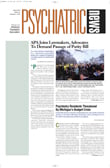From November 8 to 11, two blocks away from the White House and miles from their respective residency programs, 13 psychiatry residents attended the APA Assembly meeting in Washington, D.C.
(Psychiatric News, December 7). These residents are the voice of trainees in this part of APA’s governance. In this column I will describe to readers the work of this group in general and a special action they produced. It is just one of many instances in which APA acts as a loud voice on behalf of psychiatrists in training.
Among the members of the Assembly are representatives from each district branch of APA (reader: you belong to one). Members of the Assembly put ideas about how to improve psychiatry onto paper in the form of resolutions, or “action papers,” and these ideas may or may not ultimately be approved by the Board of Trustees.
There are 14 Assembly members who are residents or fellows, and they make up the Assembly Committee of Members in Training (ACOM).
Who are these 14 MITs? There are seven APA Areas, which encompass a number of district branches, and each sends one MIT representative and one deputy to Assembly meetings. These are the representatives who attended last month’s Assembly meeting:
Area 1: Drs. Victoria Dreisbach and Evan Eyler
Area 2: Drs. Shauna Reinblatt and Bryon Evans
Area 3: Dr. Ruben Portnoy and me
Area 4: Drs. Kangeyan Pachaiyappan and Murali Gopal
Area 5: Drs. Pamela Petersen-Crair and Glese Verlander
Area 6: Dr. John Furman; his deputy was unable to make the meeting
Area 7: Drs. Christopher Bundy and Suad Kapetanovic
At their initial meeting, ACOM learned the basic structure of the Assembly from ACOM’s chair, Dr. John Furman. Dr. Furman pointed out that Assembly reference committees decide whether to support action papers before the full Assembly votes on the papers.
One issue in particular garnered attention. Members of ACOM had, prior to the Assembly, submitted an action paper about “headhunters.” The context was that residents, including both our MIT trustee (Dr. Avram H. Mack) and the chair of ACOM, had been coping over the past six to eight months with increasingly aggressive solicitation tactics by physician recruiters. Among the methods the recruiters used were “cold calling” or “cold paging” residents during work hours. Worse, some headhunters told hospital operators that there was an “emergency,” and the operators paged them for such.
Although it is rewarding to know that our work is valued and sought after, these tactics were disturbing for many reasons. Even more disturbing was the fact that many hospitals and training directors have not been able to stop these practices. No one at the meeting knew how the headhunters (akin to industry representatives) got lists of residents’ names or their telephone or pager numbers. How many page operators screen those who are trying to contact us? And should they do so? It could impede bona fide clinical communication.
Your ACOM members decided that the best action to take at this point was to have APA state the position: Don’t disrupt the doctor-patient relationship, which is vital to the integrity of the care we provide.
The action paper asked APA to investigate this issue and adopt a policy statement discouraging its practice by recruiters. The paper also asked training directors and hospitals to notify recruiters who contact residents in this manner of the potential adverse consequences of their actions. Finally, the action paper asked ACOM to notify all U.S. psychiatry residents of the problem and strategies they can implement to curtail such tactics (so if you are reading this article, then we’re off to a good start).
We, the Assembly, your MIT trustee, and other resident leaders believe that resolving to end this problem will ensure quality patient care by residents and fellows and help maintain the integrity of our profession.
There were other matters of interest to MITs: ACOM members discussed the pros and cons of other action papers, including one sponsored by Dr. Joseph Schwartz of Johns Hopkins University. This paper asked for changes in the definition of “early career psychiatrist” for APA membership status and drops the age criterion. This would result in, for example, a new attending psychiatrist’s not having to pay the same APA dues as more established psychiatrists, regardless of the attending’s age (some attendings enter the field of psychiatry as a second career).
Another action paper, which ACOM supported, called for a strict limit to per diem spending by Assembly members during conferences, which would save APA money.
ACOM regularly produces a session for residents at the annual meeting. This year it is being put together by Dr. Reinblatt. It will be a forum in which attending psychiatrists from different subspecialties will discuss their fields and career opportunities now and in the future.
Residents and fellows have been active and valued members of the APA Assembly. I hope that members at any stage of their career will see this and realize that important work is done by the grass-roots governance. I also hope that psychiatry residents who are not yet APA members will join us in the work we do for our patients and for our profession. ▪

